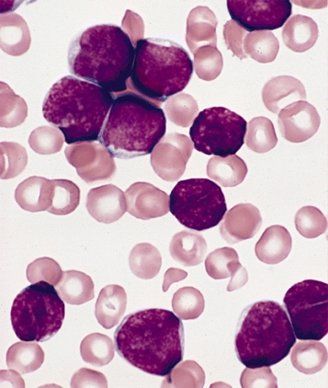Pediatric ALL Survivors Suffer Late, Increasing Neurocognitive Deficits
Adult survivors of pediatric acute lymphoblastic leukemia (ALL) suffer from persistent and significant neurocognitive deficits, according to a new study.
Bone marrow in 3-year-old ALL patient

Adult survivors of pediatric acute lymphoblastic leukemia (ALL) suffer from persistent and significant neurocognitive deficits, according to a new study.
Survivors of ALL represent the largest diagnostic group of childhood cancer survivors, according to authors of the study led by Kevin R. Krull, PhD, of St. Jude Children’s Research Hospital in Memphis, Tennessee. Late neurocognitive impairment in these patients has been attributed to cranial radiation therapy (CRT), though no large studies of such impairment in a large cohort of adult survivors has been conducted before. The new study’s results were published online ahead of print on November 4 in the Journal of Clinical Oncology.
The investigators recruited 738 adult survivors of ALL who had been treated at St. Jude’s, and 567 were eventually evaluated; all participants were at least 18 years of age and at least 10 years from diagnosis. The mean age was 33 years, and the mean time since diagnosis was 26 years.
Impairment problems ranged widely, from 28.6% for self-reported behavior problems to 58.9% for direct assessment of executive function. Severe impairment of intelligence was seen in 15.9% of participants, and severe impairment of memory was found in 20.5%. Compared with an expected rate based on healthy controls of 2%, higher rates of severe impairment were seen in executive function, attention, and memory.
The researchers also stratified patients by CRT dose, with 32.8% treated with 24-Gy CRT, 29.5% with 18 Gy, and 37.7% with chemotherapy only. They found that most domains did show increasing impairment with increasing CRT dose. A multivariable analysis showed that when compared with the chemotherapy-alone group, the 24-Gy group had increased risk for intelligence impairment (P < .001), academic impairment (P = .003), and memory problems (P < .001). The risk was modified by age at diagnosis. Furthermore, survivors treated at the highest CRT dose demonstrated increased risk for executive function impairment as the years from diagnosis increased.
“These findings suggest the need for continued objective monitoring of neurocognitive function, particularly executive functions (ie, cognitive flexibility and fluency), in adults who were treated with either chemotherapy or cranial radiation for childhood leukemia,” Krull said in an e-mail. “Neurocognitive problems appear to worsen with time and subjective self-report appears to underestimate the presence and possibly the severity of difficulty.”
Krull added that there is increasing evidence that frequent engagement in mentally challenging tasks, as well as aerobic exercise, may act as a sort of buffer against impairment in neurocognitive skills. “Other activities that seem important include healthy nutrition and sleep behavior and being socially active,” he said. “These activities are generally good for everyone, but may be particularly important for survivors of childhood ALL.”
Between the Lines Podcast: Tazemetostat in Relapsed/Refractory Follicular Lymphoma
November 3rd 2022Expert oncologist/hematologists Bruce Cheson, MD, FACP, and Steven Park, MD, discuss findings from the E7438-G000-101 trial and consider the efficacy of tazemetostat as treatment for relapsed or refractory follicular lymphoma.